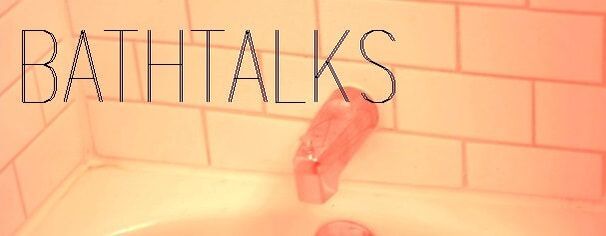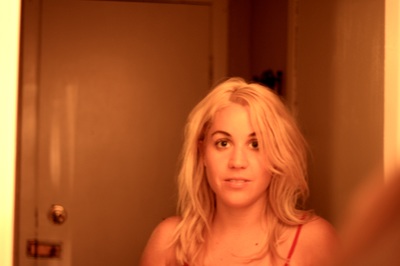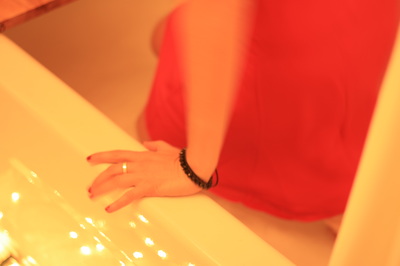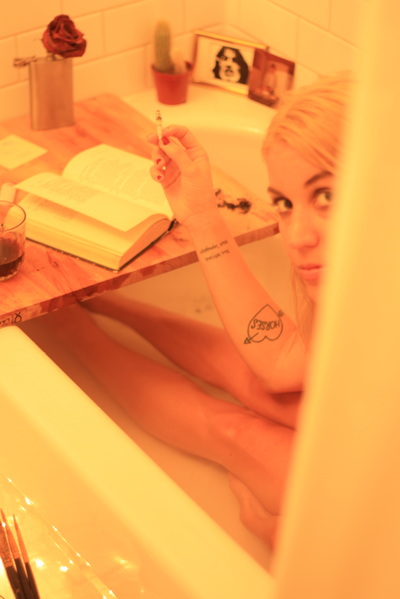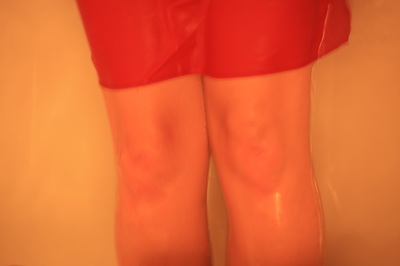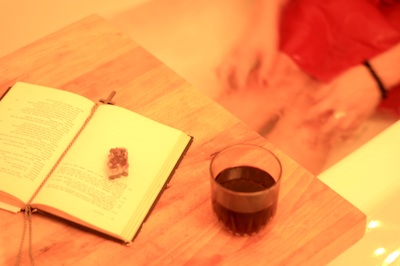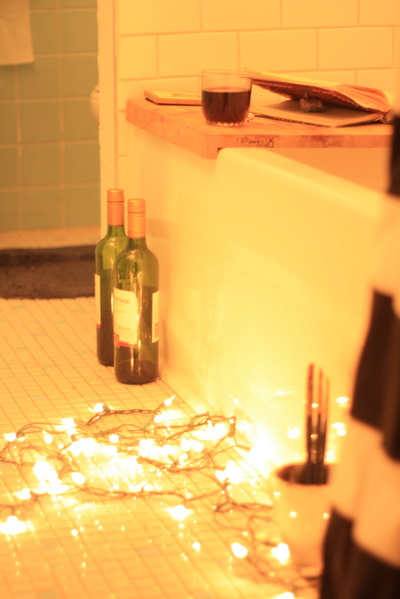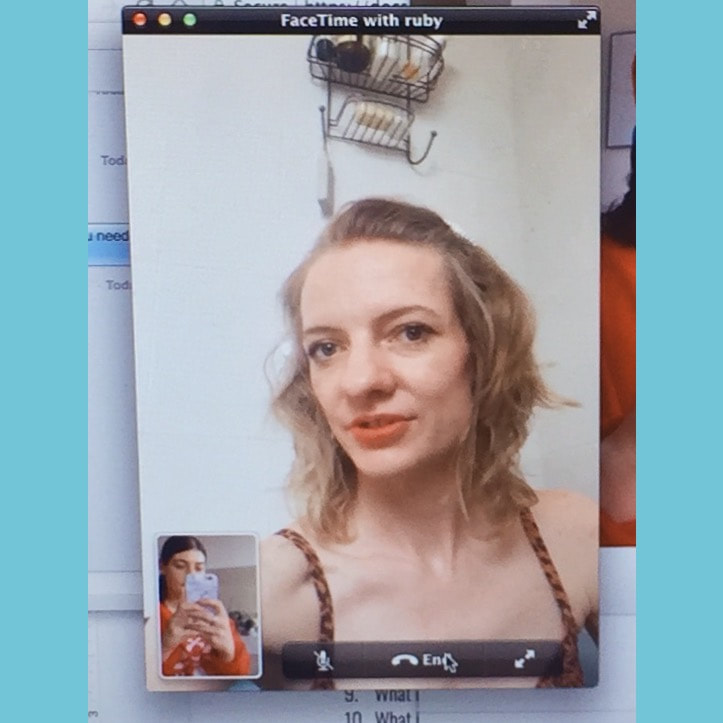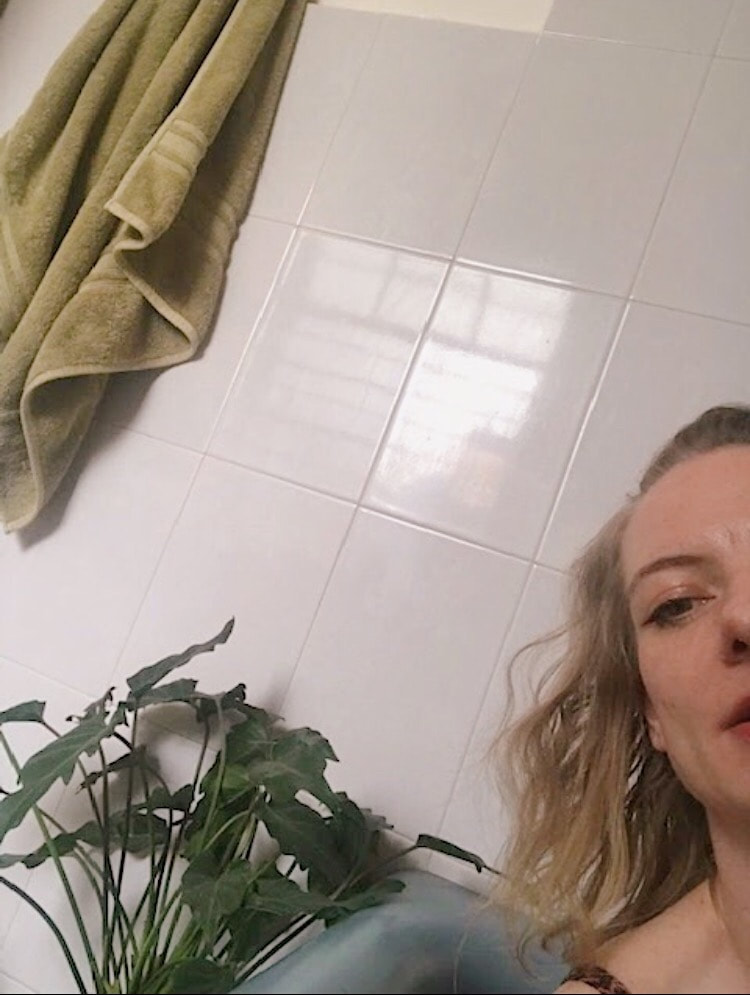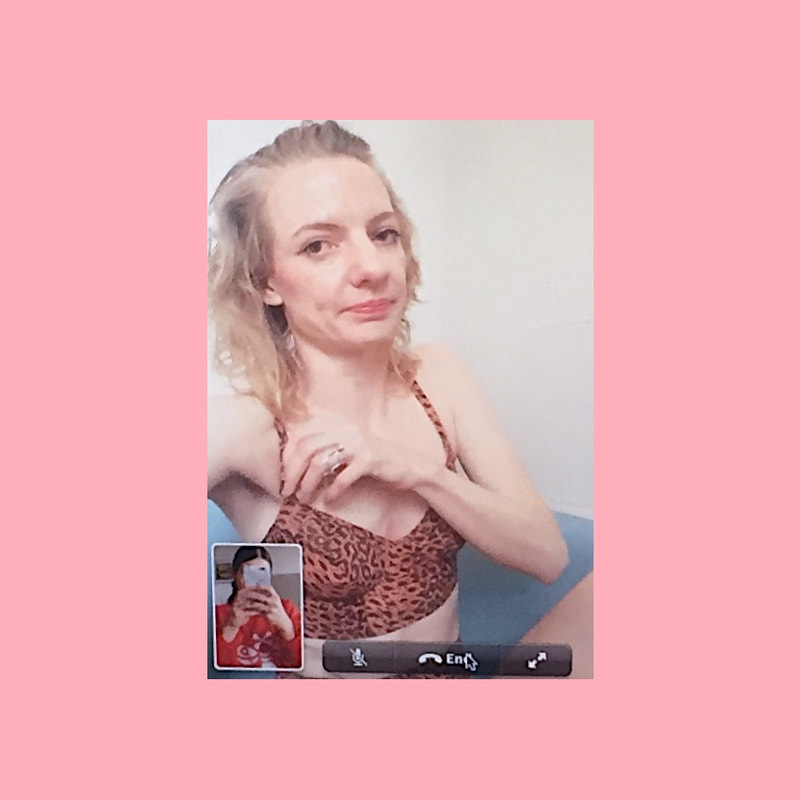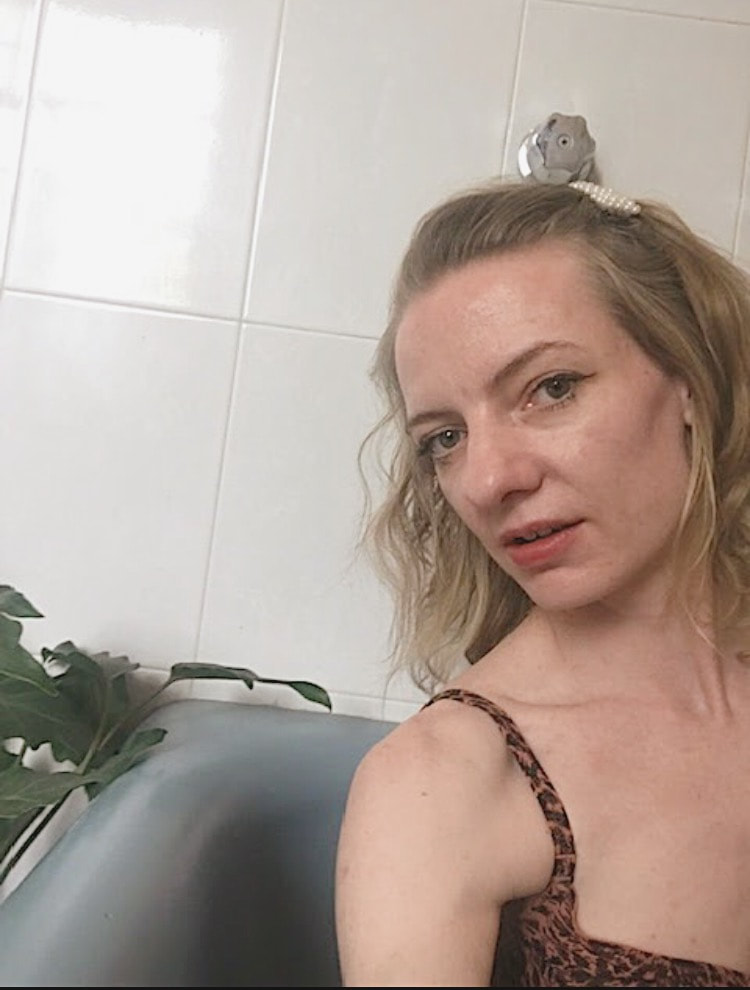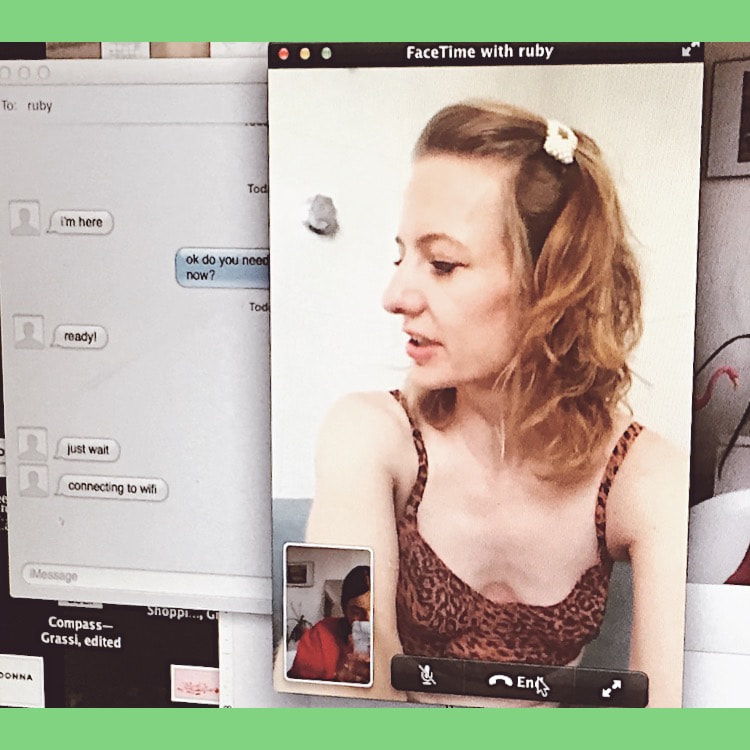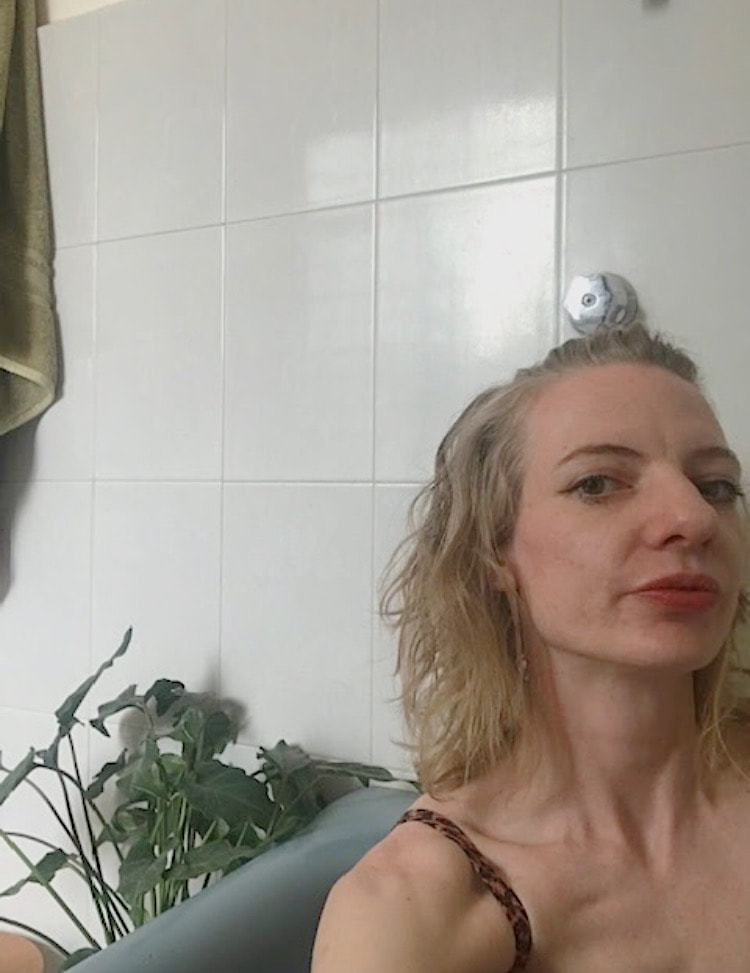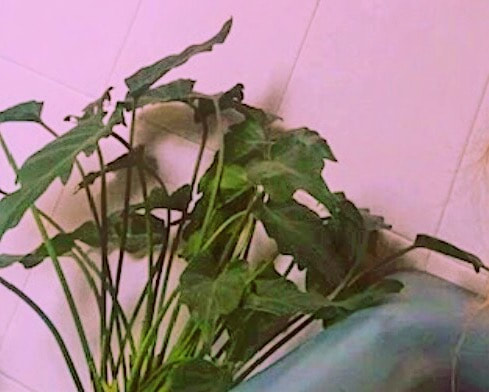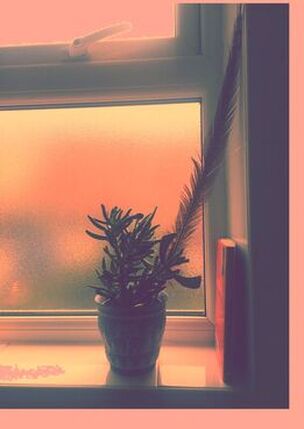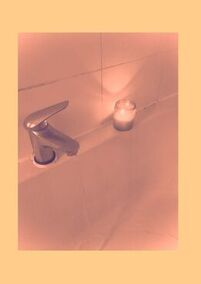Aug 28. 2015.
JENNA KENNEDY
+
Andrea Grassi (for DONNA)
TORONTO, Canada
photos: Wendy La/ Andrea Grassi
"WELL THE THING ABOUT OPHELIA IS... I DON'T BUY IT. It's like, she was obsessed with Hamlet and he let her down, and her father let her down when he passed away, and she commits suicide? Is that how the story ends? No, I like to see it more as... she will keep going, figure her life out."
DONNA: Okay JENNA, what are you going to read us in your bathtub?
JENNA: I'm going to read a little bit of Hamlet... I'm going to do a little quote from Ophelia. I'll go ahead… [laughs] ...it says to sing, 'They bore him bear faced...they said I say I made a good end.'
DONNA: Describe your bath tub.
JENNA: Okay… it's a fairly new bath tub. The other one fell apart. So it's white and the tiles are all white, with some black and shine, silver. It used to be a really cool aqua blue like the rest of the bathroom but it completely fell apart when I was bathing one day. [Laughs.]
DONNA: What is the story of the destruction of your bath tub?
JENNA: Well...
DONNA: Does it involve other people?
JENNA: Yeah, I had a friend over. His name is George. [Laughs.] But the bathroom is actually really old, so it was bound to happen. We weren't doing anything aggressive.
DONNA: It wasn't George's fault?
JENNA: No! We were not being aggressive to the tiles… It was just time for the beautiful blue to die.
DONNA: And for the new tile be your white period.
JENNA: Yes, I haven't had a bath or shower with anyone since then. The tumbling down....
DONNA: So now you’re having a bath with everyone.
JENNA: Yeah.
DONNA: That's great. This is actually the perfect spot for the first Bath Tubs interview then.
JENNA: Uh huh.
DONNA: So, if you could - and I'm just going to go straight into it [out of left field] - if you could do a minute of slow motion film, so you were the star of a minute in a slow motion film, what would you being doing in it?
JENNA: Action type of film? Or any type of film?
DONNA: Any type of film.
JENNA: Like a one minute piece? Maybe something really dangerous and underwater.
DONNA: That's cool.
JENNA: Yeah, maybe a silent film doing some really interesting stuff underwater. Dancing or swimming.
DONNA: Or making out?
JENNA: Ya, or making out. [Laughs.]
DONNA: Nice, beautiful.
JENNA: Oh yeah.
DONNA: Do you think visually when you write? Because you are a playwright as well as [poet]. Do you think in terms of scenes?
JENNA: Yeah, I think everything comes really quick with me, like I use improv with my writing and it is definitely a lot of imagery. I’ll see pictures and try and figure out the word to describe what's happening. Very visual.
DONNA: Do you have any other sort of weird quirks to your process other than obviously writing in bath tubs…
[water splashing]
JENNA: Yeah [laughs]
DONNA: [JENNA is] moving around in the water.
JENNA: I like to… my rituals are very: go be in a space, either outside or inside and like smoke something and like, put down a blanket and just let it all come out – and I always carry around a bunch of books that are influencing me at the time so if nothing is coming to be I'll just take a read through of a passage and hope something will spark from that. Yeah, I don't know, I'm a very: just be happy that things sort of come out when I ask them to. I'll just toss things out. Continuously write.
DONNA: Do you feel that inspiration comes from other writers as well?
JENNA: Oh, completely. All the time. I won't leave the house without a book in my bag.
DONNA: And one thing I know about you is that you always write in your books.
JENNA: Yeah… If I'm writing beside something it can sometimes be related to what they have written.
DONNA: Stuff you thought of while you were reading it?
JENNA: Yeah, not always though. If I'm having trouble I'll try and get something off of them.
DONNA: Are you reading anything now that's new and interesting?
JENNA: Right now I'm reading Sam Shepard's ‘Motel Chronicles’. I don't want to finish it so I'm just very slowly reading it because I like it so much. And I have two copies of it. My friend sent me a copy at the same time I had bought it. So I have two copies, it's great.
DONNA: One for reading, one for show.
JENNA: Yeah. I should give the second one away. To someone.
DONNA: I have to start giving some of my books away. I have too many. All stuffed in awkward spaces.
JENNA: And it's exciting giving away something you care about that much to someone to read and hopefully they will enjoy it just as much as you did.
DONNA: Do you have anyone in mind for ‘Motel Chronicles’?
JENNA: Someone who likes poetry and plays as much as I do. I haven't found the right person who would love it as much as I do, many friends that would enjoy it but it's my little treasure that I'll keep hostage until I meet the right person. They will come to me.
DONNA: Okay, what other books do you have on high rotation? I know you like Rilke's ‘Letters to a Young Poet’.
JENNA: Yeah, and Monica McClure’s ‘Tender Data’. I’ve been carrying that around with me a lot too. She's very modern feminism… so different from anyone I've ever read before. Her work kind of attacks you and I like it. Her writing is just really great.
DONNA: I know, I read some because you showed me the book. And we were talking about how immediate it is. You feel like you’re in conversation with her.
JENNA: When I was in Montreal a friend I had made suggested that I read her stuff and then that very same night we went to the bar and Monica McClure was a guest reader, that none of us knew was going to be there. Very good timing. She read and her performance style was so amazing and different. And then I went up to her and asked if I could buy her book. Touched me. Her last copy. She was really cool.
DONNA: Meant to have that book.
JENNA: I know.
DONNA: Never give it away to anyone. That's yours. Any other ones that you have in your rotation?
JENNA: Claudia Dey's ‘Trout Stanley’. It's a play, which you need to read. Very great short play, three characters; it's so much fun.
DONNA: Not to mention we all have a crush on Claudia Dey.
JENNA: Yeah.
DONNA: I think I want to talk about existential, spiritual things. I know you as being into tarot and times we've talked about ghost stories - that whole other world that we can't see - and if you were to think of one thing you think is really important that you can't see what would it be? I fucking love ghosts, I’ve never seen one but that’s probably why [ghost stories] fascinate me. So… one thing that you or anyone can't see, in your writing - or you like to talk about or read about - that you think is important?
JENNA: Something that we can't see....I think that nature responds a lot to dramatic climaxes in your life. I’ve had that happen to me so many times...the weather, when everything is crashing down it crashes down with you. I have a really crazy example of this: The day that my dad passed away my sister and I drove home from the hospital and on the radio came on one of his favourite songs, Rod Stewart, ‘We’re having a party’. The sky turned bright pink, it was 6 am. We drove home and I spent the day on the lawn looking out at the water wearing his t-shirt. Then all the people started coming to celebrate him, the sky just kept getting pinker and pinker, it was early August and this crazy storm came, waves crashing up on the lawn, thunder striking and our whole house flooded.
DONNA: What?!
JENNA: Everyone that was there, bailing out buckets, because the basement was flooding. Everything came to… I remember looking out - it was like Tornado warnings - and like everything was happening like right now – the pink sky, it was still a party. It was nature responding to the most dramatic moment of my life.
DONNA: Or, your father responding!
JENNA: Yeah! That's my ghost experience. He was not ready to go and we were all having a fucking party and he wanted to be there, ‘I don't want go to heaven I want to be with you guys’. Will never forget that moment, all my friends bailing out buckets, everyone helping, and I was like, ‘This is fucked’.
DONNA: And what were you doing in the middle of that?
JENNA: I was being reflective, looking out... I spend the day wearing his clothes…sitting out on a towel, being weird.
DONNA: Shit ton to process.
JENNA: Yes, surprised by the things you can't see...
DONNA: And I'm like, ‘tell me a ghost story’.
JENNA: That’s my biggest ghost story.
DONNA: A crazy good one.
JENNA: True story.
DONNA: Or did you just make that shit up right now?
JENNA: Ha no, I mean it was no coincidence, it was totally, like oh my god.
DONNA: And you could probably feel him there in some way.
JENNA: Yeah.
DONNA: I feel like if you’re a sensitive person and you are observing these things happening - whether it’s a depressive moment or happy moment or you’re at a party and you have a moment and you sit back and have an outer body experience - observing people around you, reflecting on an ‘okay I am having fun right now’ [feeling], that's a characteristic of a writer or someone-
JENNA: Narrating their own life.
DONNA: Do you find that it’s ever a problem in your life –being overly aware of your situations?
JENNA: Yeah maybe… something you can't turn off. In the long run I like being this kind of person but it does get in the way of a lot of normal day to day thing and you know I’d like to be a little more put together but not give up my imagination.
DONNA: Yeah, I feel like in some way… when [I] feel like the world is talking to me I’ll feel special in those moments. ‘Thank you for letting me see this’.
JENNA: Then other times when you feel doomed - by imagination where other people don't even deal with that dilemma - but most the time I'm happy with it.
DONNA: If you have an active imagination you have the ability to foresee way into the future, alternate realities, know what I mean? Like you can see how one thing will pan out three ways, and these all very vivid, and perhaps maybe real... Oh, your landlord’s gonna yell at us for lighting that cigarette. [Laughs.]
JENNA: Didn't really happen.
DONNA: You know I have a thing with mood. Walking against the wind, everything in my life has led up to this point, disheveled, symbolically, and in a lot of ways it’s difficult to function because you’re not always taking yourself out of the equation.
JENNA: Every morning walking to the street car, dehydrated with the leaves falling to the ground, reflecting.
DONNA: The worst is walking home drunk. Really late at night, because, I feel like there are so many signs coming to me. Looking for number patterns and everything else.
JENNA: Everything is a symbol.
DONNA: Do you even know what you’re looking for? Not really. Just wanting to experience a thing. [And you are drunk.]
JENNA: Yeah, waiting for the next big thing to happen to you, near future, goal. Do you know what the goal is? …You do, but you don't.
DONNA: Do you know what your goal is?
JENNA: Continue to meet new people who are doing the same things as I am, professionals in the art industry. It’s my life style but I’d like to be recognized for it.
DONNA: Get that play out there girl.
JENNA: I will.
DONNA: It features a bath tub.
JENNA: It's called ‘I'm in the Bath’.
DONNA: [No it’s not but] very full circle.
JENNA: Totally.
DONNA: Alright, any last words, Jenna?
JENNA: Let me do one last bit of Ophelia… [to herself] does she sing anything else? Oh yes, I'll finish it.
DONNA: But before you read it can you explain why you love this passage?
JENNA: Well the thing about Ophelia is...I don't buy it. It's like she was obsessed with Hamlet and he let her down and her father let her down when he passed away and she commits suicide? Is that how the story ends? No, I like to see it more as...she will keep going, figure her life out.
DONNA: I like that you don't buy it.
JENNA: I don't buy it... It's like no! Oh she kills herself? No… But here is her last little song. [Sings] ‘And will I not come again. And will I not come again...god be with you.’ That's it.
+++
Jenna Kennedy is a Toronto-based actor, poet and playwright. Her first book of poetry is called Love, Ophelia. You can follow her on IG @jennikenni.
Jan 21. 2020.
THE BERNADETTE EXPERIMENTS.
This month we are in the tub with writers/ performers Ruby Brunton and Raquel Vogl. They co-edited and developed The Bernadette Experiments: the culmination of work from a monthly poetry collective between women living in Canada, USA, Mexico and England (available for FREE download on our site). Each "experiment" comes from a writing prompt developed by American poet, writer and visual artist Bernadette Mayer.
RUBY
BRUNTON
Centro, Mexico City
x
ANDREA GRASSI (for DONNA)
Brooklyn, NY
photos Ruby Brunton/ screenshots Andrea Grassi
Ruby is a poet, writer and performer born in the U.S. and raised in New Zealand. She currently lives in Mexico City. She comes onto my FaceTime screen from a friend’s bathroom in Centro, laugh-screaming "it's so cold" in a leopard-print bralette. I first met Ruby in New York, when I lived with her in a Brooklyn sublet. We both recall the bathtub we had there that (most definitely) had black mold. The oval Art Deco tub she’s calling me from is a beautiful robin’s egg blue that makes Ruby’s own blue eyes spirit against the white tile on the walls.
"[DANCE] IS AN OPPORTUNITY TO ESCAPE FROM THAT SOLITARY, SEDENTARY, WORLD [OF WRITING] AND RE-ENTER MY BODY, AND RE-ENTER A SPACE WITH A BUNCH OF OTHER BODIES AND THOSE BODIES AND MY BODY... WE'RE GONNA TOUCH AND WE'RE GONNA CONNECT WITH EACH OTHER."
DONNA: Let’s talk a little bit about getting a tub in Mexico City.
RUBY: Not easy. You can get everything, anything, that you can ever dream want or need, but for some reason there are some interesting cultural quirks. Bathtubs are uncommon in apartments. I’m sure in more of the houses, but my social circles don’t include a lot of people that have houses. Another funny cultural quirk I find interesting here is that people don’t use their oven. So even if they do have an oven, it is used for storage.
DONNA: Well, good thing we’re not, like, baking pizzas for this interview.
RUBY: I mean that would be hilarious; bathtub and pizza interview. I kind of feel like this tub might be used for storage too, because I was informed by my friend that was lending it to me that it doesn’t actually function! So it is a tub, but there is no water in it right now. I am kind of cold.
DONNA: Thank you to your friend for lending it to you! It’s kind of funny because we came up with this idea of bathtub interviews as getting into an intimate space for somebody to talk about their art, but then this process for you is not an intimate space at all. If anything we failed you, because it’s cold and it’s someone else’s house!
RUBY: Yeah. I mean I was excited about it.
DONNA: So, I hope you feel like talking about your art.
RUBY: I had a really intense dance class this morning and was jumping around and doing very physical things, and I was thinking it was going to be so magical to just lay in this bath and... Well, whatever, baths are magical. Baths cure things.
DONNA: If eating in bathtubs wasn’t disgusting I would do it all the time but–
RUBY: –Here we are drinking coffee and having a lovely chat all the same.
DONNA: In a lovely blue bath. I did not think it was going to be blue!
RUBY: It’s stunning. [In Centro] a lot of the commerce happens. Lots of activities. But in this neighborhood there are also a lot of beautiful old historic apartments. This apartment my friend is subletting is so stunning. I’m so sad I have to go back to my apartment later and remind myself that I live in a much less grand space than this.
DONNA: But your own apartment.
RUBY: Yes it is pretty special. It would be even more special if it had a bath. In these old Art Deco apartments, sometimes the bathroom fixtures are just amazing colors. This is blue, I’ve seen a lot of pinks–
DONNA: –Green.
RUBY: Yeah, mint green, yes. Because we always do everything in white nowadays. So, bloody boring.
DONNA: Let’s talk about your morning at dance class. When I knew you in New York, you didn’t really dance so this is a new avenue and performance space for you right?
RUBY: Not easy. You can get everything, anything, that you can ever dream want or need, but for some reason there are some interesting cultural quirks. Bathtubs are uncommon in apartments. I’m sure in more of the houses, but my social circles don’t include a lot of people that have houses. Another funny cultural quirk I find interesting here is that people don’t use their oven. So even if they do have an oven, it is used for storage.
DONNA: Well, good thing we’re not, like, baking pizzas for this interview.
RUBY: I mean that would be hilarious; bathtub and pizza interview. I kind of feel like this tub might be used for storage too, because I was informed by my friend that was lending it to me that it doesn’t actually function! So it is a tub, but there is no water in it right now. I am kind of cold.
DONNA: Thank you to your friend for lending it to you! It’s kind of funny because we came up with this idea of bathtub interviews as getting into an intimate space for somebody to talk about their art, but then this process for you is not an intimate space at all. If anything we failed you, because it’s cold and it’s someone else’s house!
RUBY: Yeah. I mean I was excited about it.
DONNA: So, I hope you feel like talking about your art.
RUBY: I had a really intense dance class this morning and was jumping around and doing very physical things, and I was thinking it was going to be so magical to just lay in this bath and... Well, whatever, baths are magical. Baths cure things.
DONNA: If eating in bathtubs wasn’t disgusting I would do it all the time but–
RUBY: –Here we are drinking coffee and having a lovely chat all the same.
DONNA: In a lovely blue bath. I did not think it was going to be blue!
RUBY: It’s stunning. [In Centro] a lot of the commerce happens. Lots of activities. But in this neighborhood there are also a lot of beautiful old historic apartments. This apartment my friend is subletting is so stunning. I’m so sad I have to go back to my apartment later and remind myself that I live in a much less grand space than this.
DONNA: But your own apartment.
RUBY: Yes it is pretty special. It would be even more special if it had a bath. In these old Art Deco apartments, sometimes the bathroom fixtures are just amazing colors. This is blue, I’ve seen a lot of pinks–
DONNA: –Green.
RUBY: Yeah, mint green, yes. Because we always do everything in white nowadays. So, bloody boring.
DONNA: Let’s talk about your morning at dance class. When I knew you in New York, you didn’t really dance so this is a new avenue and performance space for you right?
RUBY: Absolutely. I think for a couple of reasons. First, in New York a dance class costs like $200 dollars? I mean, I’m sure it’s a lot. I think I was looking up a dance class somewhere in Union Square and it was like $20 or something [for one], really quite high, and I thought it wasn’t reasonable. But [secondly], we are surrounded by messaging all the time - in the global capitalist economy there is a lot of pressure of youth - and there is this adage repeated over and over “It is too late for me to do blah”, “It’s too late for me to do X”, “I’m too old to try Y”. I think we think those things regardless of how emotionally intelligent we are, no matter how stupid they are. It is still a thing that haunts you. And at my age, when I moved to Mexico - which was 32 - I thought it was too late. I hadn’t studied dance since I was a teenager, my body was out of shape, not physically fit. I couldn’t do push ups, I couldn't do shoulder stands... I didn’t have the high energy for that stuff. There is a lot of stuff to do with your mental health and your mental condition. Dance is super important and valuable. Especially as writers because writing is very solitary and very brain. Ruby, brain is not an adjective–
DONNA: –Cerebral.
RUBY: Yeah, doing a very cerebral activity solo. I’m getting ahead of myself, but the writing group idea [The Bernadette Mayer Experiments] was how it came about... the idea that forming little groups or doing something with other people is much more motivating and much more fun than slogging away on your own. You are also in your head so much - thinking, thinking, thinking - there is a sort of disconnect between head and body when you’ve been sitting at your computer all day and you’re like, oh I feel so stiff, and you haven’t even been aware of what the rest of your body has been doing. That’s what I really like about dance. It is an opportunity to escape from that solitary, sedentary, world and re-enter my body, and re-enter a space with a bunch of other bodies and those bodies and my body–
DONNA: –A community.
RUBY: Yeah, and we’re gonna touch and we’re gonna connect with each other. You know it is contemporary dance and contact improvisation. But I actually go to a variety [of classes] like Dancehall. Dancehall classes are fucking lit... Our teacher is from Jamaica. One thing I’m learning from Dancehall is that all of the steps are telling a story. It’s cool because our teacher also teaches us the history of the culture of the music, and all of the dancers and teachers that invented these steps and things. For every step, that is an action, and that action tells you something about the song, or the song contains the lyric that is the action of the dance step. For example: Row the Boat. Or my recent favorite move we learned the other day: Roll the Spliff... Also I do some Butoh. And I've done some African dance class. Mostly I do contemporary. Estoy clavada en el contemporaneo, I would say in Spanish. That’s the main focus.
DONNA: And so your performance is sort of like a mix of dance and your poetry, or is it one or the other, or have you done both separately?
RUBY: Well, I’m sort of moving into experimenting with this in different ways. I think it’s the joy of doing something that is not so common, or you’ve seen done so many times. I’ve actually this year, for the first time, made a solid piece that had dance choreography in it. I worked with Ana G. Zambrano, who is a dancer and choreographer from Mexico city, and very talented, and works more in dance theater and physical theater... Oh, I think I have to get out of the tub!
DONNA: –Cerebral.
RUBY: Yeah, doing a very cerebral activity solo. I’m getting ahead of myself, but the writing group idea [The Bernadette Mayer Experiments] was how it came about... the idea that forming little groups or doing something with other people is much more motivating and much more fun than slogging away on your own. You are also in your head so much - thinking, thinking, thinking - there is a sort of disconnect between head and body when you’ve been sitting at your computer all day and you’re like, oh I feel so stiff, and you haven’t even been aware of what the rest of your body has been doing. That’s what I really like about dance. It is an opportunity to escape from that solitary, sedentary, world and re-enter my body, and re-enter a space with a bunch of other bodies and those bodies and my body–
DONNA: –A community.
RUBY: Yeah, and we’re gonna touch and we’re gonna connect with each other. You know it is contemporary dance and contact improvisation. But I actually go to a variety [of classes] like Dancehall. Dancehall classes are fucking lit... Our teacher is from Jamaica. One thing I’m learning from Dancehall is that all of the steps are telling a story. It’s cool because our teacher also teaches us the history of the culture of the music, and all of the dancers and teachers that invented these steps and things. For every step, that is an action, and that action tells you something about the song, or the song contains the lyric that is the action of the dance step. For example: Row the Boat. Or my recent favorite move we learned the other day: Roll the Spliff... Also I do some Butoh. And I've done some African dance class. Mostly I do contemporary. Estoy clavada en el contemporaneo, I would say in Spanish. That’s the main focus.
DONNA: And so your performance is sort of like a mix of dance and your poetry, or is it one or the other, or have you done both separately?
RUBY: Well, I’m sort of moving into experimenting with this in different ways. I think it’s the joy of doing something that is not so common, or you’ve seen done so many times. I’ve actually this year, for the first time, made a solid piece that had dance choreography in it. I worked with Ana G. Zambrano, who is a dancer and choreographer from Mexico city, and very talented, and works more in dance theater and physical theater... Oh, I think I have to get out of the tub!
After a brief tour of her friend’s apartment (and a better look at the tub, which has some rich green plants fanning around it), Ruby starts to walk home through Centro to her apartment in Santa María la Ribera. Ruby is such a spark over the phone. (There are so many LOLs in this interview I didn’t include in the transcript.) I’m having so much fun talking to her as she guides me through her neighborhood; showing me the shops she likes and the local Senoras she lives for. She’s in a good place and it shows. I can’t help but ask her what advice she’s giving her pals lately, and what advice they have been giving her.
RUBY: Oh man, I think I've been through an interesting last couple of years of realizing that I would ask for too much advice, or ask too many people’s opinions about one problem, and then be overwhelmed with responses. I also think advice is a really interesting thing. If you’re similar to someone you give them really good advice; I think if you are different it’s not the best advice because that’s not going to work for them, or they don’t think the same way as you, or my emotional reactions are different to yours. I also think giving advice is something to be careful over: does the person really want to hear this true advice that you are giving them, or do they want something that is going to make them feel kind of good in the short term? So it is a tricky thing. I have my therapist, obviously –well I shouldn’t say obviously because it took me a long time to finally agree to do that, I thought I was terrified, and now like I’m like an ex-smoker. I’m like: God, everyone should go to therapy. I got very affordable therapy in New York because I was in a low income bracket... and I do realize that it is not possible for everyone to pay $150 dollars an hour, and I do think think that... OK, I’m getting off topic. OK. Advice, OK–
DONNA: [LOL] This is why I’m only asking you two questions.
RUBY: But then for advice I have Nance –my godmother, auntie, whatever the fuck you want to call her. I’m sick of having to label her because she is NANCE. She don’t need a label. She will give me very good advice on professional situations, work situations, she’s excellent. And I think she’s good at love advice if you are in a place where you can hear not very comfortable things –but necessary. Like: This person isn't bothering, why are you?
DONNA: Oh yeah. Something I need to hear for sure right now, actually.
RUBY: That kind of is a gut punch but a very useful, valuable thing to consider.
DONNA: We’re not always ready for real talk.
RUBY: Yeah that’s the thing, I will say - to look at the second part of your question which was, giving my friends advice - I often want to ask: Is it OK if I tell you something? Is it OK if I give you my opinion? Because people can get upset and are sensitive, especially about maybe emotional things... and now you are in a fight with this person when you were just trying to give advice.
DONNA: That sensitivity comes up in collaborations too right? Like we talked about before, dance is more communal, experienced more in your body, and actually if you think too much you forget what you’re actually supposed to do –it’s so funny how you really can't think. Writing is such a solo act, so when you get out into a community space it’s almost terrifying. Then you have to find people you trust to share it with if you aren't performing all the time. Asking for that advice or giving it is so tricky. To be a good editor is such an incredible incredible skill. You recently worked with an editor that just sort pulled from the root some realizations for you?
RUBY: Oh, Elaine Khan. God, I highly recommend her workshop. That was definitely a new and, in the beginning, uncomfortable experience for me. These days I think my motto is: do new uncomfortable things, because they usually end up being most rewarding. Like it was very difficult to me to write a poem and then have someone go: You could hack 60% of this and have a great poem. And that’s something that is just hard –it’s hard to accept and it's hard to hear, the “whole kill your darlings” thing. There’s such an interesting relationship between our psychological condition at that time, and receiving feedback and receiving advice later. I think a lot of times it’s just taking a step back and saying: What am I looking for? What is my goal? What am I trying to get out of this? Well, I am trying to get the strongest clearest piece of writing. I’m trying to communicate something here, and I want it to be communicated. And if this 60% of extra lines are blocking that, that’s not because you wrote bad lines. Actually, Elaine was very firm about that. You keep those lines! It’s not like you need to throw them in the basura [garbage] and never see them again. Those are files you can keep in your poetry Google doc folder - or however you organize your creative writing life - and come back to them. Maybe one of them will be the title of another poem. Maybe three of them will inspire a verse of another piece. I think that’s something that pays to remind ourselves of. As I was talking about before - all that messaging about “it’s too late, It’s too late” - there’s these messages of pressure and speed. And one of the reasons I’m so attracted to Bernadette Mayer experiments is because that’s what they are: experiments.
And Bernadette Mayer is super inspiring in that way because she believed so fervently in the idea of experimentation, creation, making mistakes, failures, writing a billion things you don’t actually end up using. And these are all things to get used to when we live in a system that literally tells us everything we do must count. Every second must be productive. Every second must be in service to something, usually earning money –production or consumption, right? I think Bernadette is telling us - in her very beautiful, gentle and kind of seductive way - to CHILL. Spend an hour fucking around.
DONNA: [LOL] This is why I’m only asking you two questions.
RUBY: But then for advice I have Nance –my godmother, auntie, whatever the fuck you want to call her. I’m sick of having to label her because she is NANCE. She don’t need a label. She will give me very good advice on professional situations, work situations, she’s excellent. And I think she’s good at love advice if you are in a place where you can hear not very comfortable things –but necessary. Like: This person isn't bothering, why are you?
DONNA: Oh yeah. Something I need to hear for sure right now, actually.
RUBY: That kind of is a gut punch but a very useful, valuable thing to consider.
DONNA: We’re not always ready for real talk.
RUBY: Yeah that’s the thing, I will say - to look at the second part of your question which was, giving my friends advice - I often want to ask: Is it OK if I tell you something? Is it OK if I give you my opinion? Because people can get upset and are sensitive, especially about maybe emotional things... and now you are in a fight with this person when you were just trying to give advice.
DONNA: That sensitivity comes up in collaborations too right? Like we talked about before, dance is more communal, experienced more in your body, and actually if you think too much you forget what you’re actually supposed to do –it’s so funny how you really can't think. Writing is such a solo act, so when you get out into a community space it’s almost terrifying. Then you have to find people you trust to share it with if you aren't performing all the time. Asking for that advice or giving it is so tricky. To be a good editor is such an incredible incredible skill. You recently worked with an editor that just sort pulled from the root some realizations for you?
RUBY: Oh, Elaine Khan. God, I highly recommend her workshop. That was definitely a new and, in the beginning, uncomfortable experience for me. These days I think my motto is: do new uncomfortable things, because they usually end up being most rewarding. Like it was very difficult to me to write a poem and then have someone go: You could hack 60% of this and have a great poem. And that’s something that is just hard –it’s hard to accept and it's hard to hear, the “whole kill your darlings” thing. There’s such an interesting relationship between our psychological condition at that time, and receiving feedback and receiving advice later. I think a lot of times it’s just taking a step back and saying: What am I looking for? What is my goal? What am I trying to get out of this? Well, I am trying to get the strongest clearest piece of writing. I’m trying to communicate something here, and I want it to be communicated. And if this 60% of extra lines are blocking that, that’s not because you wrote bad lines. Actually, Elaine was very firm about that. You keep those lines! It’s not like you need to throw them in the basura [garbage] and never see them again. Those are files you can keep in your poetry Google doc folder - or however you organize your creative writing life - and come back to them. Maybe one of them will be the title of another poem. Maybe three of them will inspire a verse of another piece. I think that’s something that pays to remind ourselves of. As I was talking about before - all that messaging about “it’s too late, It’s too late” - there’s these messages of pressure and speed. And one of the reasons I’m so attracted to Bernadette Mayer experiments is because that’s what they are: experiments.
And Bernadette Mayer is super inspiring in that way because she believed so fervently in the idea of experimentation, creation, making mistakes, failures, writing a billion things you don’t actually end up using. And these are all things to get used to when we live in a system that literally tells us everything we do must count. Every second must be productive. Every second must be in service to something, usually earning money –production or consumption, right? I think Bernadette is telling us - in her very beautiful, gentle and kind of seductive way - to CHILL. Spend an hour fucking around.
Car horns blare as Ruby walks along an outdoor market. The streets are crowded and she is stuck walking single file behind a man she describes as moving at a slow pace because he has a broken leg. She stops to buy three avocados from a street vendor.
"WHEN I STARTED WRITING POETRY THERE WAS SO MUCH STUFF ABOUT SOME DISAPPOINTING MAN SITUATION... AND THE STUFF I'M WRITING ABOUT NOW FEELS MORE UNIVERSAL. IT’S NOT SOUL EXPLORATION AND STUFF LIKE THAT, AND IT’S NOT SO RELATED TO A SINGLE EVENT WITH A DICKY GUY. THERE IS A SORT OF EXPANSION OF LANGUAGE BEING EMPLOYED, WHICH IS ALSO COMING FROM MY COMMITMENT TO READING A LOT MORE POETRY."
DONNA: Has your writing gone down any new avenues? Lately I have been writing a lot about teeth and women’s mouths.
RUBY: I have a few teeth in my recent poems. To go back to that topic of that corporeal connection, I think - actually I feel that - my experience of dance and movement is bleeding into the poetry. There’s a lot of verbs that were not in my previous lexicon that have entered through my classes, and yeah I definitely have noticed an exploration of a connection of that in the work. I think it’s funny. With poetry, you start out writing and there’s so much stuff about some disappointing man situation... and the stuff I'm writing about now feels more universal. It’s not soul exploration and stuff like that, and it’s not so related to a single event with a dicky guy. There is a sort of expansion of language being employed, which is also coming from my commitment to reading a lot more poetry. It’s a weird thing to say I’m going to set myself a goal to read more. A more specific one would be to read one poem by a poet I haven’t read yet, whose work I haven’t encountered every day. I think working with poets that don’t use English - Filipino poetry, Korean poetry, I obviously love Latin American poetry being here in Mexico - sort of expands your herramienta [tools]. Filipino poetry is my new jam -so rich!
DONNA: There are so many words in other languages that the English language doesn’t even contain. A feeling. In Portuguese poetry, saudade is a bunch of emotions that we don’t really have a word for in English, but is so prevalent in their art culture. And we can’t capture it. Makes me so sad that I can’t read Japanese poetry in Japanese.
RUBY: I know, and Japanese poetry is great as well. Here, there’s no way to say, or not an easy way to say, “I’m looking forward to” and I always find that really interesting because I’m always thinking: Why? Are you never looking forward to anything?
DONNA: They are more present as a speaking language.
RUBY: Maybe it is a healthier attitude to not always looking forward to shit... It’s super interesting living in a country where the language is my third, and I’m learning all these new words that can also find a way into a poem. Either I will use the Spanish word directly - because it feels like it makes sense and works - or there’s like a direct translation of a concept and a phrase that doesn’t exist in English and it creates quite beautiful linguistic moments. We have these tools of Google translate, and there are interesting ways to keep experimenting. One of the [workshop] exercises we did with Elaine Kahn was to translate a poem in a language that is not ours. So instead, you are looking at mood, and shape, and texture and all that stuff rather than the words themselves. What ends up happening is [the translated] poem ends up sounding like my poem at the end. And I think what’s different is that I have some new language happening, because I got it from the shape of the other person’s text.
DONNA: Yes. And I mean that happens in edited translations right? We will read a translation knowing that there is always the imprint of the editor/ translator there.
RUBY: Yeah. It’s super interesting to look at different translations [of the same text]. Anne Carson has done a lot of contemporary translations of Sappho and some of the Greek plays. Sappho has a great example, which was my mother’s favorite [poem]: “The moon has set, and the Pleiades; night is half over, and I lie here alone.” I think that I’ve read three or four different translations of that same poem. And sometimes instead of “I lie here alone” it’s “I’m in my bed alone," “I’m in my bed with no one," “I’m feeling solitary." The one I read is the one I remember my mom reading me, but in the course of my life have seen many more. What is interesting though, is that the emotion of the poem, or the thing I get out of it, is the power of someone who has communicated something effectively in their calling.
RUBY: I have a few teeth in my recent poems. To go back to that topic of that corporeal connection, I think - actually I feel that - my experience of dance and movement is bleeding into the poetry. There’s a lot of verbs that were not in my previous lexicon that have entered through my classes, and yeah I definitely have noticed an exploration of a connection of that in the work. I think it’s funny. With poetry, you start out writing and there’s so much stuff about some disappointing man situation... and the stuff I'm writing about now feels more universal. It’s not soul exploration and stuff like that, and it’s not so related to a single event with a dicky guy. There is a sort of expansion of language being employed, which is also coming from my commitment to reading a lot more poetry. It’s a weird thing to say I’m going to set myself a goal to read more. A more specific one would be to read one poem by a poet I haven’t read yet, whose work I haven’t encountered every day. I think working with poets that don’t use English - Filipino poetry, Korean poetry, I obviously love Latin American poetry being here in Mexico - sort of expands your herramienta [tools]. Filipino poetry is my new jam -so rich!
DONNA: There are so many words in other languages that the English language doesn’t even contain. A feeling. In Portuguese poetry, saudade is a bunch of emotions that we don’t really have a word for in English, but is so prevalent in their art culture. And we can’t capture it. Makes me so sad that I can’t read Japanese poetry in Japanese.
RUBY: I know, and Japanese poetry is great as well. Here, there’s no way to say, or not an easy way to say, “I’m looking forward to” and I always find that really interesting because I’m always thinking: Why? Are you never looking forward to anything?
DONNA: They are more present as a speaking language.
RUBY: Maybe it is a healthier attitude to not always looking forward to shit... It’s super interesting living in a country where the language is my third, and I’m learning all these new words that can also find a way into a poem. Either I will use the Spanish word directly - because it feels like it makes sense and works - or there’s like a direct translation of a concept and a phrase that doesn’t exist in English and it creates quite beautiful linguistic moments. We have these tools of Google translate, and there are interesting ways to keep experimenting. One of the [workshop] exercises we did with Elaine Kahn was to translate a poem in a language that is not ours. So instead, you are looking at mood, and shape, and texture and all that stuff rather than the words themselves. What ends up happening is [the translated] poem ends up sounding like my poem at the end. And I think what’s different is that I have some new language happening, because I got it from the shape of the other person’s text.
DONNA: Yes. And I mean that happens in edited translations right? We will read a translation knowing that there is always the imprint of the editor/ translator there.
RUBY: Yeah. It’s super interesting to look at different translations [of the same text]. Anne Carson has done a lot of contemporary translations of Sappho and some of the Greek plays. Sappho has a great example, which was my mother’s favorite [poem]: “The moon has set, and the Pleiades; night is half over, and I lie here alone.” I think that I’ve read three or four different translations of that same poem. And sometimes instead of “I lie here alone” it’s “I’m in my bed alone," “I’m in my bed with no one," “I’m feeling solitary." The one I read is the one I remember my mom reading me, but in the course of my life have seen many more. What is interesting though, is that the emotion of the poem, or the thing I get out of it, is the power of someone who has communicated something effectively in their calling.
We get to Ruby’s apartment in Santa María la Ribera. Her studio is a beautiful open space with lots of light and plants -she even has a spot in her kitchen she has dubbed the “plant hospital” to protect and work on the ones that need extra care.
RUBY: Coolest thing I can say about my new apartment - other than it is the very, very first time I have ever lived alone without roommates, without a boyfriend, without a family - is that I’m on the corner of Sor Juana Inés de la Cruz ... so Sor Juana street is my cross street and I always think that is quite a good thing when I am sitting at my little kitchen table writing some poetry. I’m thinking: Yeah. Sor Juana is just over there!
DONNA: Like she’s watching over you.
+++
Ruby’s work explores the relationship between text, sound and movement, and explores concepts of gender, psychology, intimacy and liberation struggles around the world. You can follow her on Twitter @rubybrunton and IG @armoramour
DONNA: Like she’s watching over you.
+++
Ruby’s work explores the relationship between text, sound and movement, and explores concepts of gender, psychology, intimacy and liberation struggles around the world. You can follow her on Twitter @rubybrunton and IG @armoramour
RAQUEL
VOGL
Sheffield, UK
x
ANDREA GRASSI (for DONNA)
Brooklyn, NY
photos Raquel Vogl/ edits Andrea Grassi
I've never met American writer Raquel Vogl in person, but since 2017 we've exchanged over 100 emails, and I've read drafts of over 20 of her poems, through our poetry group "The Bernadettes". Every other week, a poetry writing prompt would be sent to a small list of writers, and we would share our edits the following week. This group culminated in the aforementioned Bernadette Experiments, co-edited with Ruby Brunton (check out Ruby's #BATHTALK if you haven't). Raquel's commentary and edits for the group were always so supportive and thoughtful. This delicacy and awareness comes out in her own work which has a gentle wildness to it —almost like she only writes outdoors. In December, I emailed Raquel a few questions about her writing, collaboration, truths, lies and art. She got back to me from her tub in Sheffield, England.
DONNA: Describe the bathroom you are in (are you wearing anything!??) 👀
RAQUEL: My bathroom has white tiles from floor to ceiling. The people who lived in this house before us redid the bathroom and put in a very deep bathtub which I appreciate but do not use enough, so thank you for giving me an excuse to get in the tub. It’s the first day of winter, and it’s really dark and grim. I just got home from a run here and my feet are filthy, caked in mud, and freezing.
DONNA: How did the writing group start? How did you meet Ruby?
RAQUEL: I met Ruby teaching English in New York... We bonded over our love of English grammar and unpicking its mysteries in the dumpy breakroom of Rennert Bilingual, a private language school in East Midtown. I remember one magical night in Flushing where Ruby and I went karaoking with some coworkers. Neither of us wanted to sing, so we played percussion by banging beer bottles on a marble table, which made an insane racket louder than any of the singers. After losing touch for a few years, we found each other again and restarted a friendship based on our mutual love of language, this time in The Bernadette Experiments.
DONNA: The Bernadette Experiments: talk a little bit about how you came across [Bernadette Mayer's] work. Why do you think the experiments are important? Do you? Should other writers do it or something like it?
RAQUEL: I first heard of Bernadette Mayer through my friend and bandmate Elizabeth Reddin. (You can buy Elizabeth’s wonderful and life-changing book The Hot Garment of Love is Insecure here.) Bernadette’s work immediately resonated with me, like this poem ["Failures in Infinitives"]. I think people wanting to write should definitely do the experiments. It’s freeing to work within the confined space of a prompt. It helps to narrow my focus and the fact that they are called “experiments” lets me play in a way that produces interesting work.
RAQUEL: My bathroom has white tiles from floor to ceiling. The people who lived in this house before us redid the bathroom and put in a very deep bathtub which I appreciate but do not use enough, so thank you for giving me an excuse to get in the tub. It’s the first day of winter, and it’s really dark and grim. I just got home from a run here and my feet are filthy, caked in mud, and freezing.
DONNA: How did the writing group start? How did you meet Ruby?
RAQUEL: I met Ruby teaching English in New York... We bonded over our love of English grammar and unpicking its mysteries in the dumpy breakroom of Rennert Bilingual, a private language school in East Midtown. I remember one magical night in Flushing where Ruby and I went karaoking with some coworkers. Neither of us wanted to sing, so we played percussion by banging beer bottles on a marble table, which made an insane racket louder than any of the singers. After losing touch for a few years, we found each other again and restarted a friendship based on our mutual love of language, this time in The Bernadette Experiments.
DONNA: The Bernadette Experiments: talk a little bit about how you came across [Bernadette Mayer's] work. Why do you think the experiments are important? Do you? Should other writers do it or something like it?
RAQUEL: I first heard of Bernadette Mayer through my friend and bandmate Elizabeth Reddin. (You can buy Elizabeth’s wonderful and life-changing book The Hot Garment of Love is Insecure here.) Bernadette’s work immediately resonated with me, like this poem ["Failures in Infinitives"]. I think people wanting to write should definitely do the experiments. It’s freeing to work within the confined space of a prompt. It helps to narrow my focus and the fact that they are called “experiments” lets me play in a way that produces interesting work.
... to think of poems as objects
to think of the body as an object; failure
to believe; failure
know nothing; failure
to know everything; failure
to remember how to spell failure; failure ...
- excerpt from "Failures in Infinitives", Bernadette Mayer, 1968
DONNA: What advice have you been giving your friends lately? What have they been giving you?
RAQUEL: Say no! Make time for yourself. Before saying yes to anything, think about what you really want to do and make sure you do that. Don’t be afraid to hurt people’s feelings. I spent far too long putting basic strangers needs before my own. Advice given to me is be kind to yourself.
DONNA: Healing/ self care: so important to people who make art on their own time. What are your rituals?
RAQUEL: My rituals are running in the woods and sleeping. I live near these woods that stretch on and on… Hardly anyone uses them so I basically have them to myself. Me, the birds, the foxes, and sometimes I take my friend’s dog and he runs alongside me. Sleeping is equally important to me. I love to get in bed early and read for an hour or two. Phone on silent across the room.
DONNA: The biggest lie you tell is...
RAQUEL: The biggest lie I tell is … that I don’t really lie. No, I do of course but I can’t think of anything major right now. What do you lie about?
DONNA: Being on time!
RAQUEL: Say no! Make time for yourself. Before saying yes to anything, think about what you really want to do and make sure you do that. Don’t be afraid to hurt people’s feelings. I spent far too long putting basic strangers needs before my own. Advice given to me is be kind to yourself.
DONNA: Healing/ self care: so important to people who make art on their own time. What are your rituals?
RAQUEL: My rituals are running in the woods and sleeping. I live near these woods that stretch on and on… Hardly anyone uses them so I basically have them to myself. Me, the birds, the foxes, and sometimes I take my friend’s dog and he runs alongside me. Sleeping is equally important to me. I love to get in bed early and read for an hour or two. Phone on silent across the room.
DONNA: The biggest lie you tell is...
RAQUEL: The biggest lie I tell is … that I don’t really lie. No, I do of course but I can’t think of anything major right now. What do you lie about?
DONNA: Being on time!
DONNA: What is something we don’t know about you as an artist, and can’t find out by creeping your Twitter?
RAQUEL: Ha ha. Many things. I deleted myself off most social media and it is liberating to be anonymous and unaccountable to friends and acquaintances!
DONNA: Is there any new subject you tend to be writing about these days? (Lately mine is a woman’s/ my mouth or teeth.)
RAQUEL: New subjects. hmmm. I always write about people, mainly in an attempt to understand us. We are strange creatures and in my writing, especially my short stories, I am always trying to learn more about us.
DONNA: What is bringing you joy rn? Obsessions? Recommends?
RAQUEL: Barbara Comyns’ The Vet’s Daughter and The Juniper Tree. Creepy and perfectly described little worlds.
RAQUEL: It’s all about keeping going. I swing in cycles of productivity and loving my work and then getting little done and hating every word. It’s all about keeping going through the low periods. I’ve also realized recently that having a collection of topics that I return to is both acceptable and actually helpful. I also play guitar in two bands which is a wonderful gift to be creative with other people.
+++
RAQUEL: Ha ha. Many things. I deleted myself off most social media and it is liberating to be anonymous and unaccountable to friends and acquaintances!
DONNA: Is there any new subject you tend to be writing about these days? (Lately mine is a woman’s/ my mouth or teeth.)
RAQUEL: New subjects. hmmm. I always write about people, mainly in an attempt to understand us. We are strange creatures and in my writing, especially my short stories, I am always trying to learn more about us.
DONNA: What is bringing you joy rn? Obsessions? Recommends?
RAQUEL: Barbara Comyns’ The Vet’s Daughter and The Juniper Tree. Creepy and perfectly described little worlds.
- Lauren Groff’s Florida
- Vigdis Hjorth’s Will and Testament
- Sigrid Nunez’s Sempre Sontag
RAQUEL: It’s all about keeping going. I swing in cycles of productivity and loving my work and then getting little done and hating every word. It’s all about keeping going through the low periods. I’ve also realized recently that having a collection of topics that I return to is both acceptable and actually helpful. I also play guitar in two bands which is a wonderful gift to be creative with other people.
+++
Raquel Vogl is an American writer and musician living in Sheffield, UK. She is currently at work on a collection of short stories, and you can listen to one of her musical projects here.
june 28. 2020.
ValERIE MASSIE
x
JENNA KENNEDY (for donna)
(TORONTO, CANADA)
zoom interview
***NOTE: This interview was shot during quarantine back in April 2020, and before the murder of George Floyd. During this conversation, we talk about the struggles of isolation, but we are in no way trying to lessen or step around the events which have filled our communities with pain. We didn't feel right posting this at the time it was edited, but we offer it to you now as a tiny escape and dreamy talk about art. DONNA supports Black Lives Matter, and urges you to support Black writers and poets by reading their stories.
Before the interview with Valerie, I was feeling almost nervous or shy. Talking to my close, poet friend for the first time in some time - since COVID-19 hit - with an intimate bathtub chat! We've had baths together in the past, but this time was different. There was distance. On our laptops, over Zoom, in the bath, it all sounded kind of weird (and I was also worried about the technical aspects of it). But once we started, it was fun. In a futuristic way. Like an episode of our own lives - in this wildly historic time - that I would be happy to look back on.
JENNA (for DONNA): How’s your day?
VALERIE: It’s been nice; it’s been busy with work but good to be relaxing in the tub.
DONNA: I love your tub.
VALERIE: Thank you! I love your tub.
DONNA: We haven’t had a bath together in a while.
VALERIE: No! We haven’t. I haven’t even hugged you.
DONNA: This feels like we are close.
VALERIE: I’m at the other end of your tub. The dark side of your tub. [Laughs.]
"I don’t have a ritual. But more of a practice of knowing when inspiration strikes. But at the same time, practice does improve that. That is something I could improve on right now. If you’re writing every day, after time, something will come from that. But I am not into forcing. Allowing yourself the space for when it does strike you. Grab that lightning bolt and enjoy it."
Dreams during quarantine hit different...
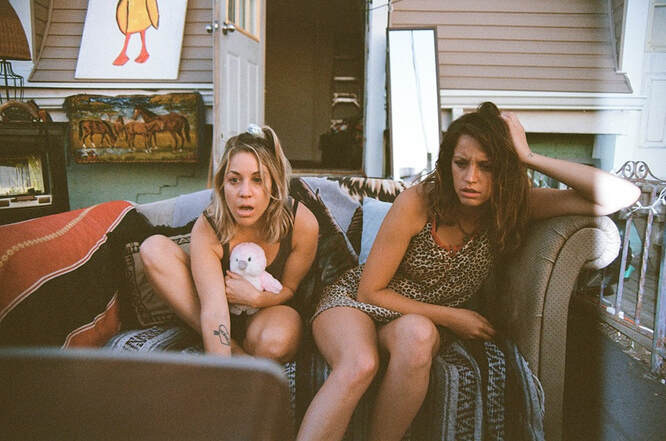 Jenna and Valerie in THEATRE ON THE ROOFTOP, TORONTO, JULY 2019. Photo by Calm Elliott-Armstrong.
Jenna and Valerie in THEATRE ON THE ROOFTOP, TORONTO, JULY 2019. Photo by Calm Elliott-Armstrong.
DONNA: Want to introduce yourself and tell everyone how we know each other?
VALERIE: I’m a writer and I like singing. Specifically, lyrics and poetry. And I like acting and performing. Jenna and I know each other because of those things. We met at a party, a small house party with close friends, and we hit it off right away, and that was mostly because we shared poetry.
DONNA: Yep. And you noticed my Patti [Smith] tattoo. And I think that’s when I knew it was friendship.
VALERIE: Yep. We shared a thing for Patti. And then you took me to a hill and made me write poems and I was like “I love her, I just love her.”
DONNA: And we haven’t stopped. You are in a beautiful tub right now. Do you want to describe it to us? Describe the room you’re in, what you’re wearing and your environment?
VALERIE: I’m wearing this moss green, kind of negligee, kind of thing. I got it at a thrift store. It reminded me of forest creatures. I wanted to wear it in the woods. But so far, I have only worn it in my house. Right now, I am in my house in Toronto.
DONNA: The perfect night to wear it.
VALERIE: Yes, it is. And who could have imagined? So I’m in my house, in this pink bathtub - purple pink - with weird 50’s tiling. Pretty trippy actually. I can’t really show the floor tiles. I also put in a pink bath bomb.
DONNA: I know it’s a crazy time in history with COVID happening, I know we both went into quarantine around the same time, middle of March. I’m wondering, is anyone influencing your world view right now? Besides maybe what you see in the news or social media? Authors? Musicians? Who’s teaching you stuff?
VALERIE: I have been listening to a lot of podcasts. But it’s hard to avoid the news right now because of the situation we are in. I have been reading a lot. Right now I’m actually reading Dracula.
DONNA: Who wrote that, not Mary Shelley?
VALERIE: Bram Stoker. It was actually written in the late 1800s, [and] I’m super into monsters. Classic monster books. Kafka’s Cockroach. I’m super into that kind of imagery and the whole idea that monsters are within us. So that’s what I’m reading right now... It’s a little hard to dream right now.
DONNA: I feel like I have been having more dreams because I can do more things in my dreams, like play outside.
VALERIE: I am having nighttime dreams. I meant like future dreams. It’s difficult right now.
DONNA: I hear you. We’ve had a few chats this year about categorizing ourselves as artists. Why we feel we need to. What purpose does that give us. I’ve heard you asking friends “What do you think I am artistically, can you define me?” I know you firstly as a poet/performer, performing in punk bands and being a vocalist for different bands around the city of Toronto. Before that you even did some modeling. You started as an actor back in your teen years at a special art school and now funny enough you got back into theatre this past summer. Can you talk a little bit about being creative in many fields, and perhaps maybe any internal struggles you may have with intertwining between many outlets at once?
VALERIE: Yes, what’s frustrating about it? I feel like maybe to be successful in one of those arts, you need to focus on one of them. And when you have many interests you can feel scattered and you are continually questioning should I be acting or should I just be writing. As I have been getting older, I am just trying to enjoy it and give up the presence that I need to be doing it for any other reason that just doing it. Enjoying it, while doing it.
DONNA: Enjoying the process is what it needs to be about.
VALERIE: Yes. Enjoying the process and know that your art can be for yourself. It’s wonderful to have a community of people to share that with, but to an extent I can be fulfilled without a million people looking at my work. Of course it would be really amazing to share and broadcast on huge level, but at the same time it’s a craft. So, it’s the act of doing it. And it gives you something. And for me, sharing my work validates my work. Just the act of be able to share. To speak your mind, being able to say how you’re feeling. Everyone wants to get the chance to do that.
DONNA: It’s funny, I did a bathtub interview many years ago. And someone I grew up with reached out to me and said they had just read my piece. Even though it was so long ago, a paragraph made her cry, a memory of my dad; it’s good to know it’s out there and can connect to someone at any time.
VALERIE: Yes, that’s absolutely something to think about. I think of my mom’s writing. She was such a good writer but she never pursued it. It was amazing to find her writing. To humanize my mom. To see her writing from high school. As far as legacy, just being able to share with my family. I always think about how we don’t really know our ancestry. It fades away. And you will fade away.
DONNA: How cool to read something your great grandmother wrote.
VALERIE: Yes, and paper is also something that is not absolute. To potentially unearth or in any kind of physical form. Sometimes I do wonder about digital; if [future generations] will come back to our Facebook page. Even this interview, oh here is a record of people during COVID-19, how bizarre. Who knows. In which case, “Hello.” [laughs].
DONNA: Do you have any projects you are working on, or rituals you are using to get into your art?
VALERIE: I don’t have a ritual. But more of a practice of knowing when inspiration strikes. But at the same time, practice does improve that. That is something I could improve on right now. If you’re writing every day. After time, something will come from that. But I am not into forcing. Allowing yourself the space for when it does strike you. Grab that lightning bolt and enjoy it. Right now it has been coming out in different way. I have been feeling music, writing some songs. But mostly just writing. I have been thinking about sewing. I don’t have a sewing machine though. I would love to be doing more theatre.
DONNA: If we could think of something we could do with theatre and technology, that would be amazing.
VALERIE: [To reader] Jenna and I did a play last summer.
DONNA: We did a play on a rooftop. This time last year we were rehearsing for it.
VALERIE: One of the most rewarding things I have done in my life so far. On our own accord. Our own will. It was not easy.
DONNA: No, it wasn’t easy. I am just looking back at it and they way that we did it was a collaboration of people we know, with little structure, no solid structure.
VALERIE: That’s something that sucks about theatre. It’s not as accessible. At least in this city.
DONNA: It costs so much money to put something on.
VALERIE: Yes and I think that’s why we made it more pedestrian. More like accessible for everyone. How you would see a band play. It would be so cool if more people went to see theatre and poetry like they do for bands.
DONNA: I love that kind of thing. That’s the theatre I want to see.
VALERIE: Hard work pays off. That’s something with my art I always wanting it to be instantaneous. That’s why it’s hard for me to focus. With the play we stuck with it for so long and I was so happy with it. If you do stick to something, stick to a plan, you are passionate, it will pay off. A good lesson for me.
DONNA: Let’s talk a little about the Donna collective, you and me did a poetry night not too long ago, seems like ages now but it was in February, at a small art space in Toronto. We had planned to do more, hoping even monthly. Now we are working on an online poetry project together, doing Zoom meetings every Sunday with prints created by the participants, writing and sharing our work with other poets from around the world, New York, Mexico, and Toronto. Can you chat a little with me on how things have changed, now artistic experiences are being shared online, you personally or even what you have seen being created by other artists? What you like, dislike, where you think virtual art is going?
VALERIE: I have been really enjoying the Donna Collective and then moving online to the video way we do things, we did it last year through email and the video is personalizing everything.
DONNA: It’s great to get to see everybody.
VALERIE: And to get to hear the way they read their poems. I’m personally very performative. I like my poems to be read out loud. I’m not the most amazing at grammar, or punctuation, so it’s cool hearing people say it straight from the source.
DONNA: So, what we are talking about is our online poetry group and we meet every Sunday. Thank you Ruby Brunton for pushing this thing to get going. We do an exercise every week that prompts the poem and then we share. And it’s been really fun.
VALERIE: Other online arts, I think that it’s something that is inevitable. It has already been happening, basically pushing small communities to meet, like ours, in places like Zoom. I haven’t really been enjoying the online concerts, personally, but I do think that it’s a good thing.
DONNA: I’m loving Lou Dillon’s online presence. She does an hour a day on Instagram and it's usually reading poetry, chit chats, and you can just pop in and see what she’s up to. Her apartment is so aesthetically pleasing, with her books everywhere and her dog.
VALERIE: I don’t know if you can hear that. My tub is like making noises when I move.
DONNA: Mine does a sucking sound. The pipes.
VALERIE: Can you do it?
DONNA: No, I can’t make it do it. [Laughs.] Have you been having repetitive patterns in your dreams?
VALERIE: I had one about you last night, but it’s not really a good story because I can’t remember it.
DONNA: [Laughs.]
VALERIE: I’ve been having dreams where I’m doing the things I wish that I was doing. I had one with us and we went to a cottage. And I had one with my friend Sarah, who is also in our Donna Collective group, and we went to Kensington [Market], trying to go out for dinner. I feel like I have also been having panicked dreams and escapist feelings, but that’s probably pretty normal.
DONNA: I’ve been having a lot of dreams where I’m taking on new jobs. I work from home so I’m doing what I’ve basically been doing and I feel like when this is all over. I want to like run free and not be stuck inside. Maybe that means not an office job anymore. Or at least try something different, life is full of possibilities.
VALERIE: Yep.
DONNA: So have you had a good year, as far as learning about yourself, Val? I feel like some days I fall into a hole, I go very internal, just learning to become a hermit. Want to share a big thing you have learned and maybe want to portray in your poetry? Not just COVID, but the whole year?
VALERIE: I was having a good year. 2019 was pretty amazing. Doing the play was great and rewarding, and when we took our trip to Mexico I fell in love. I was really on cloud 9 by New Years Eve. But [2020] has been a bit of a bummer. I am trying to measure my emotions, because I haven’t been feeling that great. But maybe that’s okay. We feel isolated, fragile and vulnerable and lonely and that’s going to make you sad. So I am trying not to blame myself. No real routine. The thing that makes me happy is spontaneity. We can’t have that right now, but ironically it is also the thing that stresses me out. We don’t know what is going on and I feel out of control, skeptical of information, distrusting, and poisonous feelings to feel. But I’m pretty sure we are going to have this massive revival to the earth because everyone is so hungry for it. For human contact and sunshine!
DONNA: I can’t wait. Can’t wait.
VALERIE: And I miss you! So much!
DONNA: You too. You too.
+++
VALERIE: I’m a writer and I like singing. Specifically, lyrics and poetry. And I like acting and performing. Jenna and I know each other because of those things. We met at a party, a small house party with close friends, and we hit it off right away, and that was mostly because we shared poetry.
DONNA: Yep. And you noticed my Patti [Smith] tattoo. And I think that’s when I knew it was friendship.
VALERIE: Yep. We shared a thing for Patti. And then you took me to a hill and made me write poems and I was like “I love her, I just love her.”
DONNA: And we haven’t stopped. You are in a beautiful tub right now. Do you want to describe it to us? Describe the room you’re in, what you’re wearing and your environment?
VALERIE: I’m wearing this moss green, kind of negligee, kind of thing. I got it at a thrift store. It reminded me of forest creatures. I wanted to wear it in the woods. But so far, I have only worn it in my house. Right now, I am in my house in Toronto.
DONNA: The perfect night to wear it.
VALERIE: Yes, it is. And who could have imagined? So I’m in my house, in this pink bathtub - purple pink - with weird 50’s tiling. Pretty trippy actually. I can’t really show the floor tiles. I also put in a pink bath bomb.
DONNA: I know it’s a crazy time in history with COVID happening, I know we both went into quarantine around the same time, middle of March. I’m wondering, is anyone influencing your world view right now? Besides maybe what you see in the news or social media? Authors? Musicians? Who’s teaching you stuff?
VALERIE: I have been listening to a lot of podcasts. But it’s hard to avoid the news right now because of the situation we are in. I have been reading a lot. Right now I’m actually reading Dracula.
DONNA: Who wrote that, not Mary Shelley?
VALERIE: Bram Stoker. It was actually written in the late 1800s, [and] I’m super into monsters. Classic monster books. Kafka’s Cockroach. I’m super into that kind of imagery and the whole idea that monsters are within us. So that’s what I’m reading right now... It’s a little hard to dream right now.
DONNA: I feel like I have been having more dreams because I can do more things in my dreams, like play outside.
VALERIE: I am having nighttime dreams. I meant like future dreams. It’s difficult right now.
DONNA: I hear you. We’ve had a few chats this year about categorizing ourselves as artists. Why we feel we need to. What purpose does that give us. I’ve heard you asking friends “What do you think I am artistically, can you define me?” I know you firstly as a poet/performer, performing in punk bands and being a vocalist for different bands around the city of Toronto. Before that you even did some modeling. You started as an actor back in your teen years at a special art school and now funny enough you got back into theatre this past summer. Can you talk a little bit about being creative in many fields, and perhaps maybe any internal struggles you may have with intertwining between many outlets at once?
VALERIE: Yes, what’s frustrating about it? I feel like maybe to be successful in one of those arts, you need to focus on one of them. And when you have many interests you can feel scattered and you are continually questioning should I be acting or should I just be writing. As I have been getting older, I am just trying to enjoy it and give up the presence that I need to be doing it for any other reason that just doing it. Enjoying it, while doing it.
DONNA: Enjoying the process is what it needs to be about.
VALERIE: Yes. Enjoying the process and know that your art can be for yourself. It’s wonderful to have a community of people to share that with, but to an extent I can be fulfilled without a million people looking at my work. Of course it would be really amazing to share and broadcast on huge level, but at the same time it’s a craft. So, it’s the act of doing it. And it gives you something. And for me, sharing my work validates my work. Just the act of be able to share. To speak your mind, being able to say how you’re feeling. Everyone wants to get the chance to do that.
DONNA: It’s funny, I did a bathtub interview many years ago. And someone I grew up with reached out to me and said they had just read my piece. Even though it was so long ago, a paragraph made her cry, a memory of my dad; it’s good to know it’s out there and can connect to someone at any time.
VALERIE: Yes, that’s absolutely something to think about. I think of my mom’s writing. She was such a good writer but she never pursued it. It was amazing to find her writing. To humanize my mom. To see her writing from high school. As far as legacy, just being able to share with my family. I always think about how we don’t really know our ancestry. It fades away. And you will fade away.
DONNA: How cool to read something your great grandmother wrote.
VALERIE: Yes, and paper is also something that is not absolute. To potentially unearth or in any kind of physical form. Sometimes I do wonder about digital; if [future generations] will come back to our Facebook page. Even this interview, oh here is a record of people during COVID-19, how bizarre. Who knows. In which case, “Hello.” [laughs].
DONNA: Do you have any projects you are working on, or rituals you are using to get into your art?
VALERIE: I don’t have a ritual. But more of a practice of knowing when inspiration strikes. But at the same time, practice does improve that. That is something I could improve on right now. If you’re writing every day. After time, something will come from that. But I am not into forcing. Allowing yourself the space for when it does strike you. Grab that lightning bolt and enjoy it. Right now it has been coming out in different way. I have been feeling music, writing some songs. But mostly just writing. I have been thinking about sewing. I don’t have a sewing machine though. I would love to be doing more theatre.
DONNA: If we could think of something we could do with theatre and technology, that would be amazing.
VALERIE: [To reader] Jenna and I did a play last summer.
DONNA: We did a play on a rooftop. This time last year we were rehearsing for it.
VALERIE: One of the most rewarding things I have done in my life so far. On our own accord. Our own will. It was not easy.
DONNA: No, it wasn’t easy. I am just looking back at it and they way that we did it was a collaboration of people we know, with little structure, no solid structure.
VALERIE: That’s something that sucks about theatre. It’s not as accessible. At least in this city.
DONNA: It costs so much money to put something on.
VALERIE: Yes and I think that’s why we made it more pedestrian. More like accessible for everyone. How you would see a band play. It would be so cool if more people went to see theatre and poetry like they do for bands.
DONNA: I love that kind of thing. That’s the theatre I want to see.
VALERIE: Hard work pays off. That’s something with my art I always wanting it to be instantaneous. That’s why it’s hard for me to focus. With the play we stuck with it for so long and I was so happy with it. If you do stick to something, stick to a plan, you are passionate, it will pay off. A good lesson for me.
DONNA: Let’s talk a little about the Donna collective, you and me did a poetry night not too long ago, seems like ages now but it was in February, at a small art space in Toronto. We had planned to do more, hoping even monthly. Now we are working on an online poetry project together, doing Zoom meetings every Sunday with prints created by the participants, writing and sharing our work with other poets from around the world, New York, Mexico, and Toronto. Can you chat a little with me on how things have changed, now artistic experiences are being shared online, you personally or even what you have seen being created by other artists? What you like, dislike, where you think virtual art is going?
VALERIE: I have been really enjoying the Donna Collective and then moving online to the video way we do things, we did it last year through email and the video is personalizing everything.
DONNA: It’s great to get to see everybody.
VALERIE: And to get to hear the way they read their poems. I’m personally very performative. I like my poems to be read out loud. I’m not the most amazing at grammar, or punctuation, so it’s cool hearing people say it straight from the source.
DONNA: So, what we are talking about is our online poetry group and we meet every Sunday. Thank you Ruby Brunton for pushing this thing to get going. We do an exercise every week that prompts the poem and then we share. And it’s been really fun.
VALERIE: Other online arts, I think that it’s something that is inevitable. It has already been happening, basically pushing small communities to meet, like ours, in places like Zoom. I haven’t really been enjoying the online concerts, personally, but I do think that it’s a good thing.
DONNA: I’m loving Lou Dillon’s online presence. She does an hour a day on Instagram and it's usually reading poetry, chit chats, and you can just pop in and see what she’s up to. Her apartment is so aesthetically pleasing, with her books everywhere and her dog.
VALERIE: I don’t know if you can hear that. My tub is like making noises when I move.
DONNA: Mine does a sucking sound. The pipes.
VALERIE: Can you do it?
DONNA: No, I can’t make it do it. [Laughs.] Have you been having repetitive patterns in your dreams?
VALERIE: I had one about you last night, but it’s not really a good story because I can’t remember it.
DONNA: [Laughs.]
VALERIE: I’ve been having dreams where I’m doing the things I wish that I was doing. I had one with us and we went to a cottage. And I had one with my friend Sarah, who is also in our Donna Collective group, and we went to Kensington [Market], trying to go out for dinner. I feel like I have also been having panicked dreams and escapist feelings, but that’s probably pretty normal.
DONNA: I’ve been having a lot of dreams where I’m taking on new jobs. I work from home so I’m doing what I’ve basically been doing and I feel like when this is all over. I want to like run free and not be stuck inside. Maybe that means not an office job anymore. Or at least try something different, life is full of possibilities.
VALERIE: Yep.
DONNA: So have you had a good year, as far as learning about yourself, Val? I feel like some days I fall into a hole, I go very internal, just learning to become a hermit. Want to share a big thing you have learned and maybe want to portray in your poetry? Not just COVID, but the whole year?
VALERIE: I was having a good year. 2019 was pretty amazing. Doing the play was great and rewarding, and when we took our trip to Mexico I fell in love. I was really on cloud 9 by New Years Eve. But [2020] has been a bit of a bummer. I am trying to measure my emotions, because I haven’t been feeling that great. But maybe that’s okay. We feel isolated, fragile and vulnerable and lonely and that’s going to make you sad. So I am trying not to blame myself. No real routine. The thing that makes me happy is spontaneity. We can’t have that right now, but ironically it is also the thing that stresses me out. We don’t know what is going on and I feel out of control, skeptical of information, distrusting, and poisonous feelings to feel. But I’m pretty sure we are going to have this massive revival to the earth because everyone is so hungry for it. For human contact and sunshine!
DONNA: I can’t wait. Can’t wait.
VALERIE: And I miss you! So much!
DONNA: You too. You too.
+++
Valerie Massie is a traumatic, true romantic poet, singer, actor and performer living in Toronto. When asked to describe her work, she responded: I have been swallowed, this is my message from the inside. Read some of her work on DONNA or follow her on IG at @vvvvmessy.
